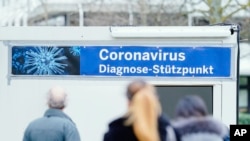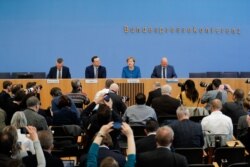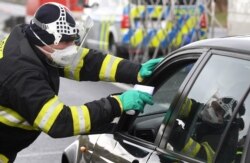Germany will spend what it takes to tackle the coronavirus which is likely to infect up to 70% of the population in Europe's largest economy, Chancellor Angela Merkel said Wednesday.
"We will do what we need to get through this. And then at the end we will look at what that means for our budget," she told reporters, seeming to distance herself from Germany's policy of no new borrowing.
Though conceding she did not know how the crisis would develop, Merkel said the risk was huge.
"When the virus is out there, and the population has no immunity and no vaccination or therapy exists, then a high percentage — experts say 60 to 70% of the population — will be infected, so long as this remains the case," she said.
That drew swift criticism from the Czech prime minister who said Merkel's remarks could cause panic.
Germany has confirmed three deaths related to the coronavirus. It has reported 1,296 cases, according to the Robert Koch Institute for disease control.
The chancellor was speaking after mass-selling daily Bild berated her for what it called "the corona chaos."
"No appearances, no speech, no leadership in the crisis," it wrote.
Merkel urged Germans to watch their personal hygiene and contacts, recommending they look each other in the eye "for a second longer" rather than shake hands.
"We will do what is necessary as a country, and that is also together with Europe," added the chancellor, who spoke to fellow European Union (EU) leaders and the president of the European Central Bank (ECB) on Tuesday evening.
"We cannot yet gauge the economic consequences ... but we will react," said Merkel, whose government has promised "timely, targeted" stimulus.
Post-war federalism in spotlight
In a radio interview, Health Minister Jens Spahn said sealing borders, as neighbor Austria has done to Italians, would not work.
At the news conference with Merkel, he urged Germans to stay away from soccer matches, concerts and clubs, but said he was "very reserved" about blanket closures of nurseries and schools as many public service workers rely on them being open.
The crisis has drawn attention to Germany's federal system of government, in which power is devolved to the 16 states and regional authorities. They must decide for themselves whether to follow Spahn's advice to cancel events with over 1,000 people.
Spahn said it was "astonishing" that no decision had been taken to call off a football match between Union Berlin and Bayern Munich scheduled in Berlin on Saturday, though the city later said it would take place behind closed doors.
"The corona crisis shows that, without clear guidance, federalism in the fight against epidemics is reaching its limits," Bild wrote.
Merkel said federalism did not mean anyone could evade responsibility, and that she would meet state premiers on Thursday to coordinate the coronavirus response.
During Merkel's news conference, Berlin's city authorities said they had banned events with more than 1,000 participants until the end of Easter holidays in mid-April.
Germany's federal system was agreed by its victorious enemies after World War II and enshrined in its constitution to avoid a repeat of the centralized power wielded by the Nazis.







